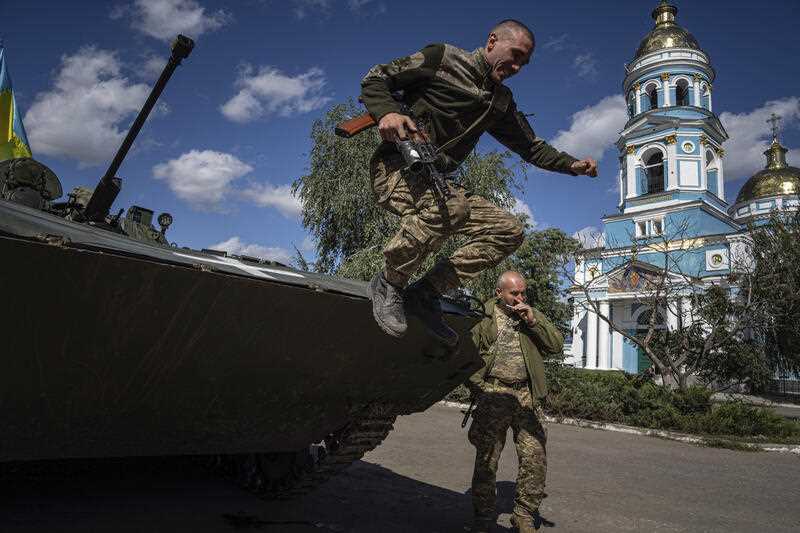Russia has paved the way for the formal annexation of swathes of Ukrainian territory, backing referendum plans in areas of Ukraine its soldiers control in a move that could sharply escalate the conflict.
After nearly seven months of war, including a critical battlefield defeat in northeastern Ukraine, Russian President Vladimir Putin is pondering his next steps.
In what appeared to be choreographed requests, Russian-backed officials across 15 per cent of Ukrainian territory – an area about the size of Hungary or Portugal – lined up to request referendums on joining Russia.
The self-styled Donetsk (DPR) and the Luhansk People’s Republics (LPR), which Putin recognised as independent just before the invasion, and the Kherson and Zaporizhzhia regions have asked for votes over less than 24 hours.
Luhansk, Donetsk and Kherson officials said the referendums would take place in just days – on Friday September 23 through to Monday September 27.
Russia does not fully control any of the four regions, with only about 60 per cent of the Donetsk region in Russian hands.
Asked about the referendums, Russian Foreign Minister Sergei Lavrov said: “From the very start of the operation… we said that the peoples of the respective territories should decide their fate, and the whole current situation confirms that they want to be masters of their fate.”
If Russia formally annexed a vast additional chunk of Ukraine, Putin would essentially be daring the United States and its European allies to risk a direct military confrontation with Russia, the world’s biggest nuclear power.
“All this talk about immediate referendums is an absolutely unequivocal ultimatum from Russia to Ukraine and the West,” Tatiana Stanovaya, founder of the political analysis firm R.Politik, said.
French President Emmanuel Macron called the referendum plans “a parody”.
“If the Donbas referendum idea wasn’t so tragic,it would be funny,” he told reporters in New York.
European Union foreign policy chief Josep Borrell said the bloc and its member states would not recognise the outcome of the referendums and would consider further measures against Russia if the votes went ahead.
Dmitry Medvedev, who served as Russian president from 2008 to 2012 and is now deputy chairman of the Russian Security Council, backed the referendums, which he said would change the path of Russian history and allow the Kremlin more options for defence of what he said would become Russian territory.
“Encroachment onto Russian territory is a crime which allows you to use all the forces of self–defence,” Medvedev said in a post on Telegram.
“This is why these referendums are so feared in Kyiv and the West.”
“It is equally important that after the amendments to the constitution of our state, no future leader of Russia, no official will be able to reverse these decisions.”
Vyacheslav Volodin, the Speaker of Russia’s lower house of parliament, the Duma, said he would support the folding in of parts of Ukraine that voted to join Russia.
Ukraine said the threat of referendums was “naive blackmail” and a sign Russia was running scared.
“This is what the fear of defeat looks like. The enemy is afraid and obfuscates primitively,” said Andriy Yermak, chief of staff to Ukrainian President Volodymyr Zelenskiy.
“Ukraine will solve the Russian issue. The threat can only be eliminated by force.”
Ukraine says it will never accept Russian control over its territory and has called on other countries to supply more and better arms to fight Russian forces.
The conflict in eastern Ukraine began in 2014 after a pro-Russian president was toppled in Ukraine’s Maidan Revolution and Russia annexed Crimea, while Russian-backed separatists in the Donbas – which is comprised of Donetsk and Luhansk – sought to break away from Kyiv’s control.
After Russian forces took control of Crimea, which has an ethnic Russian majority and was transferred to Ukraine in Soviet times, on February 27, 2014, a referendum on joining Russia was held on March 16.
Crimea’s leaders declared a 97 per cent vote to secede from Ukraine.
Russia formally added Crimea on March 21.
Ukraine said the referendum violated its constitution and international law.
Get the latest news, sport, entertainment, lifestyle, competitions and more delivered straight to your inbox with the Canberra Daily Daily Newsletter. Sign up here.



